A nurse is caring for a client who has toxoplasmosis and asks about the cause of the infection. Which of the following responses should the nurse make?
Handling cat feces
Touching body fluids
Drinking contaminated water
Eating shellfish
The Correct Answer is A
Toxoplasmosis is an infection caused by the Toxoplasma gondii parasite. The primary mode of transmission is through the ingestion of the parasite's oocysts, which are commonly found in cat feces.
When a person comes into contact with cat feces, such as during cleaning of the litter box or gardening in soil contaminated with cat feces, they can inadvertently ingest the parasite. Therefore, handling cat feces is a common route of transmission for toxoplasmosis.

Nursing Test Bank
Naxlex Comprehensive Predictor Exams
Related Questions
Correct Answer is C
Explanation
Leukorrhea refers to the increased vaginal discharge that is common during pregnancy. It is usually thin, white, or milky in appearance and is caused by hormonal changes and increased blood flow to the vaginal area. Informing the client about this normal pregnancy symptom can help alleviate concerns and promote reassurance.
Facial swelling, especially during the first trimester, is not a common discomfort experienced in early pregnancy. It can be a symptom of other underlying medical conditions, such as preeclampsia, which should be evaluated by a healthcare provider.
While gastrointestinal changes and bowel irregularities can occur during pregnancy, including constipation, diarrhea is not typically associated with the first trimester. Persistent or severe diarrhea should be assessed by a healthcare provider as it can indicate an underlying issue or infection.
Burning or discomfort during urination is not a typical discomfort of the first trimester. It is more commonly associated with urinary tract infections (UTIs) or other urinary issues. If a client experiences these symptoms, they should be evaluated by a healthcare provider for appropriate diagnosis and treatment.
Correct Answer is A
Explanation
During a mass casualty event, it is crucial for the nurse to assess and determine the acuity level (severity) and number of casualties who will be arriving at the healthcare facility. This information helps in planning and organizing resources, triaging patients based on their needs, and ensuring that appropriate care is provided to those who require immediate attention.
Delegating tasks to emergency health care specialists is a role that may be performed by a nurse in a leadership or supervisory position. However, the immediate priority for the nurse is to assess and triage incoming casualties.
Providing informational updates to members of the media is usually handled by designated spokespersons or communication specialists within the healthcare facility or incident command system. Nurses are primarily focused on patient care and should not be responsible for media communication during a mass casualty event.
Assisting in discharging stable clients to home is not directly related to the immediate response and care of casualties from a mass casualty event. The nurse's focus in such situations is primarily on the management of the incoming casualties and ensuring the availability of resources and care for those who require immediate attention.
Whether you are a student looking to ace your exams or a practicing nurse seeking to enhance your expertise , our nursing education contents will empower you with the confidence and competence to make a difference in the lives of patients and become a respected leader in the healthcare field.
Visit Naxlex, invest in your future and unlock endless possibilities with our unparalleled nursing education contents today
Report Wrong Answer on the Current Question
Do you disagree with the answer? If yes, what is your expected answer? Explain.
Kindly be descriptive with the issue you are facing.
